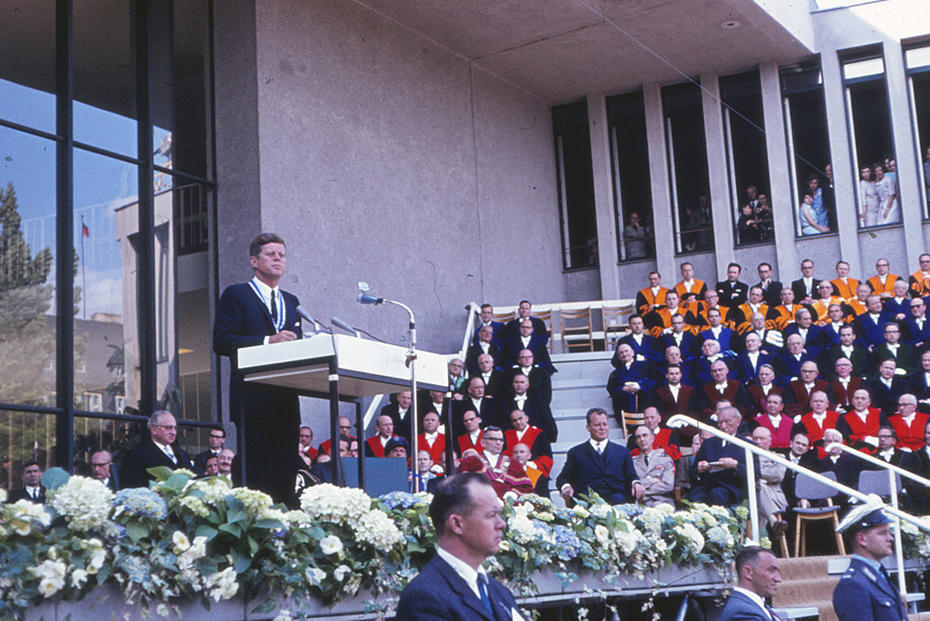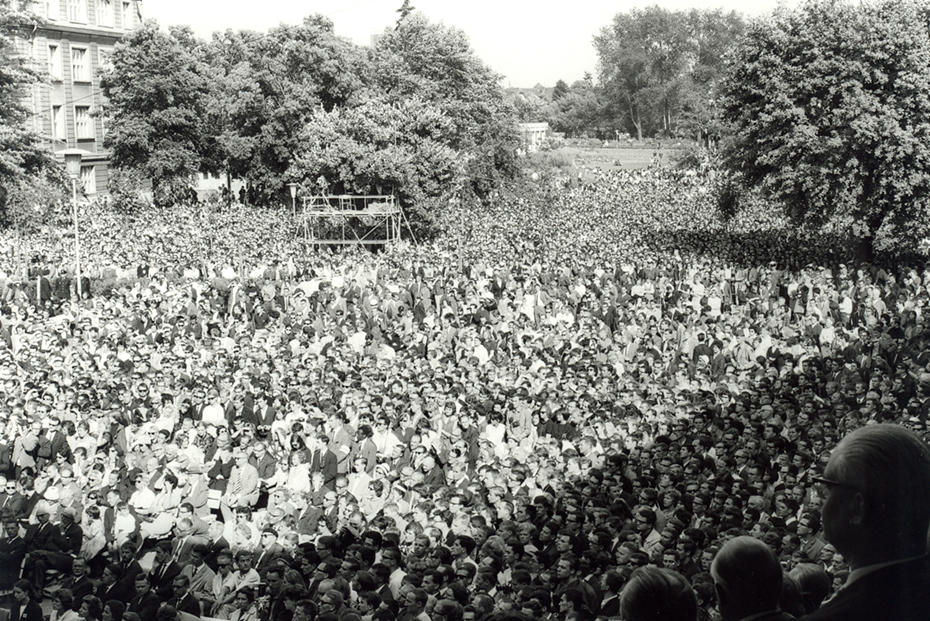“Obligations to Truth, to Justice, and to Liberty”
Two eyewitnesses speak about the impact of US president John F. Kennedy’s visit to Berlin and Freie Universität sixty years ago
Jul 04, 2023
Kennedy held his second speech of the day in Dahlem, calling upon Freie Universität Berlin to produce “citizens of the world [...] who are willing to commit their energies to the advancement of a free society.”
Image Credit: Ingrid Lorenz
US president John F. Kennedy cemented his status as one of the twentieth century’s greatest orators and leaders on June 23, 1963, when he delivered his “Ich bin ein Berliner” speech from the steps of Rathaus Schöneberg (the district townhall). The famous line was a commitment to protect the city and a pledge to uphold its freedom. Hundreds of thousands of Berliners, who had shown up to witness history being made, cheered on the streets as Kennedy stood at his podium, engulfed by thunderous applause.
The American delegation then set off for Dahlem, forming a convoy with Willy Brandt, who was mayor of Berlin at that time, and German chancellor Konrad Adenauer. The Academic Senate of Freie Universität had invited the president to the campus in this leafy suburb to make him an honorary member of the university. Surrounded by about 20,000 people in front of the Henry Ford Building, Kennedy would deliver a second iconic speech that same day. “The bleachers, where the academic dignitaries would be sitting in their robes, were set up right at the front,” Hans-Jürgen Puhle remembers. “Huge crowds of students gathered behind them, stretching across the entire lawn, all the way back to the old canteen and the law school.”
Puhle, who later became a professor of political science in Frankfurt am Main, was a student at Freie Universität back then. As a student representative on the Academic Senate, he was at the heart of the action. “The visit was both a political and a social event,” he says. “And we were amazed to see how young and dynamic Kennedy looked beside our chancellor, who was sitting rigidly beside him.”
Kennedy’s Speech Struck a Chord on Campus
In Dahlem, Kennedy spoke about the immense importance of universities – especially their students – for the future of the free world. Freie Universität Berlin was to produce citizens of the world, who would put the skills they gained through their university education to use in the pursuit of a free society. “That made a strong impression on us students back then,” says Puhle.
Ernst Elitz, too, recalls how Kennedy’s words resonated with the student body. The future director of Deutschlandradio was studying German literature at Freie Universität and had already gotten his foot in the door as a journalist. He covered the event as the editor-in-chief of FU-Spiegel, the university’s student newspaper at the time. “A great number of students back then came from East Germany, myself included,” he says. “Many had just escaped over the border to the West and had first-hand experiences of the repressive system in place in the GDR. They were euphoric about the values that Kennedy espoused.”
Thousands of students came to hear the US president speak, including Ernst Elitz and Hans-Jürgen Puhle.
Image Credit: Reinhard Friedrich/Universitätsarchiv Freie Universität Berlin
The visit and conferral of an honorary degree were also conceived of as an opportunity for Freie Universität Berlin to thank the American people for their help. “It would not have been possible to found Freie Universität without US support – especially that of the Ford Foundation, who set the event in motion,” says Elitz.
Elitz was involved in planning a special edition of the FU-Spiegel for the fifteen-year anniversary of the university in December 1963. A few months before the paper was set to be printed, the General Student Committee (AStA) had managed to send a request via the Ford Foundation to have Kennedy write its editorial and get it approved. But their hopes were dashed when John F. Kennedy was assassinated in Dallas, Texas, on November 22, 1963.
Shortly after hearing about the shooting on the radio, Elitz and Puhle received a call from the head of AStA. “It hit us very hard,” says Puhle. “So we decided to organize a procession to mourn his death.” Elitz, who had a number of contacts as an up-and-coming journalist, got in touch with local radio stations. Together with hundreds of others, they marched from Dahlem to Rathaus Schöneberg as a way of paying their respects to a man who had been a stalwart of freedom.
Kennedy’s Legacy at Freie Universität
A short time later, Puhle joined forces with Ernst Fraenkel to petition for the newly founded Central Institute for North American Studies to be renamed in honor of the recently deceased president. This prestigious interdisciplinary center bears Kennedy’s name to this very day.
When the special edition of FU-Spiegel was published in December 1963, instead of an editorial Elitz chose to write a dedication on behalf of the student body to John Fitzgerald Kennedy, “President of the United States of America and honorary graduate of Freie Universität Berlin.”
The page ends with a quote from Kennedy’s Dahlem speech: “But life is never easy. There is work to be done and obligations to be met – obligations to truth, to justice, and to liberty.” These words in Latin – “veritas, justitia, libertas” – are immortalized on the seal of Freie Universität Berlin, and have come to define its ethos over the decades.
The original German version of this article appeared in campus.leben, the online magazine published by Freie Universität Berlin.


